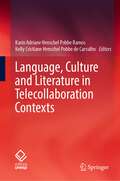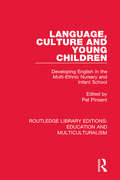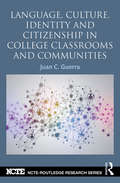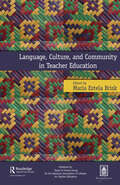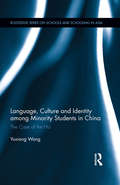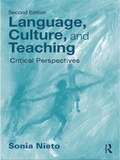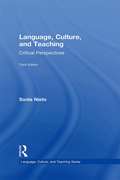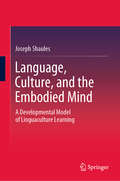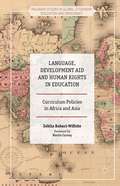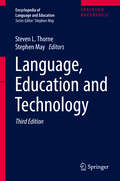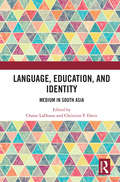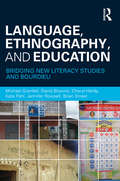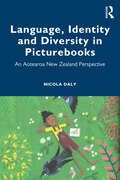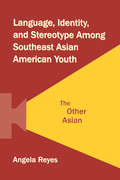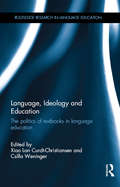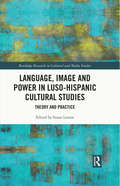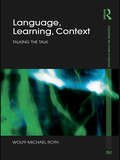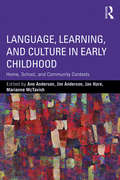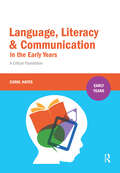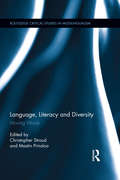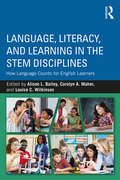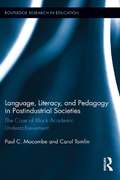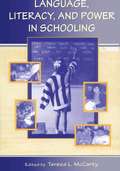- Table View
- List View
Language, Culture and Literature in Telecollaboration Contexts
by Karin Adriane Henschel Pobbe Ramos Kelly Cristiane Henschel Pobbe de CarvalhoThis book describes and analyses experiences of teaching and learning language, culture and literature based on telecollaboration, an approach that creates interactions between groups of learners from different countries through the integration of a series of virtual and intercultural collaborative tasks to the curricula of undergraduate and graduate courses. The experiences analyzed in this volume come from two telecollaborative projects developed by the São Paulo State University (UNESP), in Brazil, with universities from other countries: the Brazilian Virtual Exchange (BRaVE) Program and the Teletandem Brasil Project. The BRaVE Program aims at fostering an online collaborative learning modality that promotes intercultural contact and the exchange of ideas by connecting Brazilian undergraduate or graduate students with students from different higher education institutions around the world. The Teletandem Brasil Project is based on a mode of telecollaboration (teletandem) that creates a virtual, collaborative and autonomous context for learning foreign languages in which two students help each other to learn their own languages or a language of proficiency. They do so by using the text, voice and webcam image resources, and by adopting the three principles of tandem learning: autonomy, reciprocity, and separate use of both languages. Language, Culture and Literature in Telecollaboration Contexts will be of interest to both educational researchers and teachers as it presents, on the one hand, an innovative tool to promote the democratization of foreign language learning; and, on the other hand, discusses how telecollaborative projects can contribute to the training of language and literature teachers.
Language, Culture and Young Children: Developing English in the Multi-ethnic Nursery and Infant School (Routledge Library Editions: Education and Multiculturalism #8)
by Pat PinsentOriginally published in 1992. This book is designed to help the teacher facing the challenge posed by multi-ethnic, multi-cultural, multi-language classes. The contributions, from teachers and Higher Education tutors, are based on experience and research in this area and their emphasis is practical with theoretical support being provided where relevant. Part one considers issues of difference, including looking at oral language development, issues of assessment, and the particular needs of traveller children, among other topics. The second part looks at stories and books while the third looks at active language use in writing and drama. Part four suggests useful resources.
Language, Culture, Identity and Citizenship in College Classrooms and Communities (NCTE-Routledge Research Series)
by Juan C. GuerraLanguage, Culture, Identity and Citizenship in College Classrooms and Communities examines what takes place in writing classrooms beyond academic analytical and argumentative writing to include forms that engage students in navigating the civic, political, social and cultural spheres they inhabit. It presents a conceptual framework for imagining how writing instructors can institute campus-wide initiatives, such as Writing Across Communities, that attempt to connect the classroom and the campus to the students’ various communities of belonging, especially students who have been historically underserved. This framework reflects an emerging perspective—writing across difference—that challenges the argument that the best writing instructors can do is develop the skills and knowledge students need to make a successful transition from their home discourses to academic discourses. Instead, the value inherent in the full repertoire of linguistic, cultural and semiotic resources students use in their varied communities of belonging needs to be acknowledged and students need to be encouraged to call on these to the fullest extent possible in the course of learning what they are being taught in the writing classroom. Pedagogically, this book provides educators with the rhetorical, discursive and literacy tools needed to implement this approach.
Language, Culture, and Community in Teacher Education
by María Estela BriskPublished by Routledge for the American Association of Colleges for Teacher Education This volume addresses the pressing reality in teacher education that all teachers need to be prepared to work effectively with linguistically and culturally diverse student populations. Every classroom in the country is already, or will soon be, deeply affected by the changing demographics of America’s students. Marilyn Cochran-Smith’s Foreword and Donaldo Macedo’s Introductory Essay set the context with respect to teacher education and student demographics, followed by a series of chapters presented in three sections: knowledge, practice, and policy. The literature on language education has typically been discussed in relation to preparing ESL or bilingual teachers. Typically, needs of culturally and linguistically diverse students, including immigrants, refugees, language minority populations, African Americans, and deaf students, have been addressed separately. This volume emphasizes that these children have both common educational needs and needs that are culturally and linguistically specific. It is directed to the preparation of ALL teachers who work with culturally and linguistically diverse students. It not only focuses on how teachers need to change but how faculty and curriculum need to be transformed, and how to better train teacher education candidates to understand and work efficaciously with the communities in which culturally and linguistically diverse students tend to be predominant. The American Association of Colleges for Teacher Education (AACTE) is a national, voluntary association of higher education institutions and related organizations. Our mission is to promote the learning of all PK-12 students through high-quality, evidence-based preparation and continuing education for all school personnel. For more information on our publications, visit our website at: www.aacte.org.
Language, Culture, and Identity among Minority Students in China: The Case of the Hui (Routledge Series on Schools and Schooling in Asia #3)
by Yuxiang WangThis book explores Hui (one of the Muslim minority groups in China) students’ lived experiences in an elementary school in central P. R. China from the perspectives of philosophical foundations of education and the sociology of education, the impact of their experiences on their identity construction, and what schooling means to Hui students. The book describes a vivid picture of how the Hui construct their own identities in the public school setting, and how the state curricula, teachers, and parents play roles in student identity construction. The objectives of the book are to discover factors that impact Hui students’ identity construction and have caused Hui students to know little about their own culture and language; and to explore what should be done to help teachers, administrators, and policy makers appreciate minority culture and include minority culture and knowledge in school curriculum in order to meet the needs of Hui students.The book provides historical, policy, and curricular contexts for readers to understand Hui students’ experiences in central China, and discusses the cultural differences between Han and Hui from a philosophical level. The book uses postcolonial theory to critique the assimilative nature of school education, the construction of Hui students’ identity from Han ideology, and the cultural hegemony of the mainstream Han group. It also discusses curriculum reconceptualization both in China and globally, and the possibility of multicultural education in China.
Language, Culture, and Teaching
by Sonia NietoDistinguished multiculturalist Sonia Nieto speaks directly to current and future teachers in this thoughtful integration of a selection of her key writings with creative pedagogical features. Offering information, insights, and motivation to teach students of diverse cultural, racial, and linguistic backgrounds, this text is intended for upper-undergraduate and graduate-level students and professional development courses. Examples are included throughout to illustrate real-life dilemmas about diversity that teachers face in their own classrooms; ideas about how language, culture, and teaching are linked; and ways to engage with these ideas through reflection and collaborative inquiry. Each chapter includes critical questions; classroom activities; and community activities suggesting projects beyond the classroom context. Over half of the chapters are new to this edition, bringing it up-to-date in terms of recent educational policy issues and demographic changes in our society.
Language, Culture, and Teaching: Critical Perspectives (Language, Culture, and Teaching #23)
by Sonia NietoDistinguished multiculturalist Sonia Nieto speaks directly to current and future teachers in this thoughtful integration of a selection of her key writings with creative pedagogical features. Offering information, insights, and motivation to teach students of diverse cultural, racial, and linguistic backgrounds, examples are included throughout to illustrate real-life dilemmas about diversity that teachers face in their own classrooms; ideas about how language, culture, and teaching are linked; and ways to engage with these ideas through reflection and collaborative inquiry. Designed for upper-undergraduate and graduate-level students and professional development courses, each chapter includes critical questions, classroom activities, and community activities suggesting projects beyond the classroom context. Language, Culture, and Teaching • explores how language and culture are connected to teaching and learning in educational settings; • examines the sociocultural and sociopolitical contexts of language and culture to understand how these contexts may affect student learning and achievement; • analyzes the implications of linguistic and cultural diversity for classroom practices, school reform, and educational equity; • encourages practicing and preservice teachers to reflect critically on their classroom practices, as well as on larger institutional policies related to linguistic and cultural diversity based on the above understandings; and • motivates teachers to understand their ethical and political responsibilities to work, together with their students, colleagues, and families, for more socially just classrooms, schools, and society. Changes in the Third Edition: This edition includes new and updated chapters, section introductions, critical questions, classroom and community activities, and resources, bringing it up-to-date in terms of recent educational policy issues and demographic changes in the U.S. and beyond. The new chapters reflect Nieto’s current thinking about the profession and society, especially about changes in the teaching profession, both positive and negative, since the publication of the second edition of this text.
Language, Culture, and the Embodied Mind: A Developmental Model of Linguaculture Learning
by Joseph ShaulesThere is an odd contradiction at the heart of language and culture learning: Language and culture are, so to speak, two sides of a single coin—language reflects the thinking, values and worldview of its speakers. Despite this, there is a persistent split between language and culture in the classroom. Foreign language pedagogy is often conceptualized in terms of gaining knowledge and practicing skills, while cultural learning goals are often conceptualized in abstract terms, such as awareness or criticality.This book helps resolve this dilemma. Informed by brain and mind sciences, its core message is that language and culture learning can both be seen as a single, interrelated process—the embodiment of dynamic systems of meaning into the intuitive mind. This deep learning process is detailed in the form of the Developmental Model of Linguaculture Learning (DMLL). Grounded in dynamic skill theory, the DMLL describes four developmental levels of language and culture learning, which represents a subtle, yet important shift in language and culture pedagogy. Rather than asking how to add culture into language education, we should be seeking ways to make language and culture learning deeper—more integrated, embodied, experiential and transformational. This book provides a theoretical approach, including practical examples, for doing so.
Language, Development Aid and Human Rights in Education: Curriculum Policies In Africa And Asia (Palgrave Studies In Global Citizenship Education And Democracy Ser.)
by Zehlia Babaci-WilhiteThe debate about languages of instruction in Africa and Asia involves an analysis of both the historical thrust of national government and also development aid policies. Using case studies from Tanzania, Nigeria, South Africa, Rwanda, India, Bangladesh and Malaysia, Zehlia Babaci-Wilhite argues that the colonial legacy is perpetuated when global languages are promoted in education. The use of local languages in instruction not only offers an effective means to contextualize the curriculum and improve student comprehension, but also to achieve quality education and rights in education.
Language, Education and Nation-building
by Peter Sercombe Ruanni TupasThis volume tracks the complex relationships between language, education and nation-building in Southeast Asia, focusing on how language policies have been used by states and governments as instruments of control, assimilation and empowerment. Leading scholars have contributed chapters each representing one of the countries in the region.
Language, Education and Technology
by Stephen May Steven L. ThorneIn this third, fully revised edition, the 10 volume Encyclopedia of Language and Education offers the newest developments, including an entirely new volume of research and scholarly content, essential to the field of language teaching and learning in the age of globalization. In the selection of topics and contributors, the Encyclopedia reflects the depth of disciplinary knowledge, breadth of interdisciplinary perspective, and diversity of socio-geographic experience in the language and education field. Throughout, there is an inclusion of contributions from non-English speaking and non-western parts of the world, providing truly global coverage. Furthermore, the authors have sought to integrate these voices fully into the whole, rather than as special cases or international perspectives in separate sections. The Encyclopedia is a necessary reference set for every university and college library in the world that serves a faculty or school of education, as well as being highly relevant to the fields of applied and socio-linguistics. The publication of this work charts the further deepening and broadening of the field of language and education since the publication of the first edition of the Encyclopedia in 1997 and the second edition in 2008.
Language, Education, and Identity: Medium in South Asia
by Chaise LaDousa; Christina P. DavisThis book examines medium of instruction in education and studies its social, economic, and political significance in the lives of people living in South Asia. It provides insight into the meaning of medium and what makes it so important to identity, aspiration, and inequality. It questions the ideologized associations between education and social and spatial mobility and discusses the gender- and class-based marginalization that comes with vernacular-medium education. The volume also considers how policy measures, such as the Right to Education (RTE) Act in India, have failed to address the inequalities brought by medium in schools, and investigates questions on language access, inclusion, and rights. Drawing on extensive fieldwork and in-depth interviews, the book will be indispensable for students and scholars of anthropology, education studies, sociolinguistics, sociology, and South Asian studies. It will also appeal to those interested in language and education in South Asia, especially the role of language in the reproduction of inequality.
Language, Ethnography, and Education: Bridging New Literacy Studies and Bourdieu (Real Language Ser.)
by Jennifer Rowsell Kate Pahl Michael Grenfell David Bloome Brian V Street Cheryl HardyThis frontline volume contributes to the social study of education in general and literacy in particular by bringing together in a new way the traditions of language, ethnography, and education. Integrating New Literacy Studies and Bourdieusian sociology with ethnographic approaches to the study of classroom practice, it offers an original and useful reference point for scholars and students of education, language, and literacy wishing to incorporate Bourdieu’s ideas into their work. More than just a set of stand-alone chapters around social perspectives on language interactions in classrooms, this book develops and unfolds dialogically across three sections: Bridging New Literacy Studies and Bourdieu – Principles; Language, Ethnography and Education - Practical Studies; Working at the Intersections – In Theory and Practice. The authors posit ‘Classroom Language Ethnography’ as a genuinely new perspective with rich and developed traditions behind it, but distinct from conventional approaches to literacy and education — an approach that bridges those traditions to yield fresh insights on literacy in all its manifestations, thereby providing a pathway to more robust research on language in education.
Language, Identity and Diversity in Picturebooks: An Aotearoa New Zealand Perspective
by Nicola DalyThis book presents a range of perspectives on the way language, diversity, and identity are reflected in New Zealand children’s literature, based on the published research of Nicola Daly, an associate professor in the Division of Education of the University of Waikato, and her colleagues.The book is organised into two sections. The first section examines the use of Te Reo Māori and English in the text of New Zealand picturebooks, exploring the linguistic landscape of Māori-English bilingual picturebooks. The second section, The Pedagogical Potential of Picturebooks, explores how picturebooks featuring Māori, English, New Zealand Sign Language (NZSL), and Pacific languages reflect identity and support diversity in society. Research from several educational contexts, ranging from kindergarten to university, where picturebooks are used to support learning language and learning about language is also discussed. Themes of language, identity, and diversity are explored throughout the two sections and brought together in the concluding chapter’s discussion of the power of picturebooks.This book will be of interest to scholars in children’s literature and education; it may also be relevant to scholars in linguistics library and information studies, cultural studies, and media and communication studies.
Language, Identity and Education on the Arabian Peninsula: Bilingual Policies in a Multilingual Context
by Louisa BuckinghamThis collection examines the urban multilingual realities of inhabitants of the Arabian Peninsula in the early 21st century from the perspectives of learners, teachers and researchers. Focusing on both public and private spheres, it considers the importance of both English and immigrants' languages in a context of rapid socioeconomic development. Extending beyond English-Arabic societal bilingualism, the language practices of the Peninsula's citizens and residents serve multiple purposes in their daily lived realities. Chapters on home and heritage languages, identity, ELT, commercial signage and academic publishing contribute to a deepening understanding of the inherent linguistic diversity in these dynamic societies.
Language, Identity, and Stereotype Among Southeast Asian American Youth: The Other Asian
by Angela ReyesThis book—an ethnographic and discourse analytic study of an after-school video-making project for 1.5- and second-generation Southeast Asian American teenagers—explores the relationships among stereotype, identity, and ethnicity that emerge in this informal educational setting. Working from a unique theoretical foundation that combines linguistic anthropology, Asian American studies, and education, and using rigorous linguistic anthropological tools to closely examine video- and audio- recorded interactions gathered during the video-making project (in which teen participants learned the skills for creating their own video and adult staff learned to respect and value the local knowledge of youth), the author builds a compelling link between micro-level uses of language and macro-level discourses of identity, race, ethnicity, and culture. In this study of the ways in which teens draw on and play with circulating stereotypes of the self and the other, Reyes uniquely illustrates how individuals can reappropriate stereotypes of their ethnic group as a resource to position themselves and others in interactionally meaningful ways, to accomplish new social actions, and to assign new meanings to stereotypes. This is an important book for academics and students in sociolinguistics, linguistic anthropology, discourse analysis, and applied linguistics with an interest in issues of youth, race, and ethnicity, and/or educational settings, and will also be of interest to readers in the fields of education, Asian American studies, social psychology, and sociology.
Language, Ideology and Education: The politics of textbooks in language education (Routledge Research in Language Education)
by Csilla Weninger Xiao Lan Curdt-ChristiansenThis book examines the role textbooks play in the teaching of dominant and non-dominant (first and foreign) languages in a range of cultural contexts worldwide. Each chapter addresses important issues related to what constitutes "legitimate knowledge", the politics of learning materials, global cultural awareness, competing ideologies, and the development of multilingual literacies. Language, Ideology and Education: The Politics of Textbooks in Language Education comprehensively surveys theoretical perspectives and methodological issues in the critical examination of language textbooks. In particular, it looks at: The Cultural Politics of Language Textbooks in the Era of Globalization The Politics of Instructional Materials for English for Young Learners Ideological Tensions and Contradictions in Lower Primary English Teaching Materials in Singapore Creating a Multilingual/multicultural Space in Japanese EFL: A Critical Analysis of Discursive Practices within a New Language Education Policy The book is primarily addressed to those who teach and research in the areas of Foreign Language Education, TESOL, Applied Linguistics, Language Policy, Critical Pedagogy, and Textual Cultures. Although the book is focused on textbook and materials analysis, rather than evaluation, most chapters discuss implications for curriculum design and materials development and therefore will be relevant to scholars working in those fields.
Language, Image and Power in Luso-Hispanic Cultural Studies: Theory and Practice (Routledge Research in Cultural and Media Studies)
by Susan LarsonThis volume explores the history, evolution, and future of Luso-Hispanic Cultural Studies as a discipline, a pedagogical tool, and a set of working practices by bringing together a diverse group of renowned specialists to examine how the field has grown out of and radically reconsidered some of the basic premises of British Cultural Studies since the 1950s to address the many cultures of the Spanish and Portuguese-speaking world. The chapters in this volume address How Cultural Studies is being practiced in the increasingly virtual mediascapes of the twenty-first century What happens to basic critical assumptions about culture and power after they have passed through the filter of Post-Colonial and Decolonial Studies of the Luso-Hispanic world How we understand the role of culture in light of recent experiences with radical demographic shifts, populism and civil unrest within Latin America, Iberian and the Latino U.S How new ways of practising Luso-Hispanic Cultural Studies have worked their way into our pedagogy and the structure of the curriculum in the age of the increasingly privatized neoliberal university Providing keen insight and reflection on these questions, this volume is an essential read for scholars and students of Visual and Film Studies, Latin American and Iberian Studies, Luso-Brazilian Studies, Language and Culture Pedagogy, Global Studies, and for anyone interested in Cultural Studies across the Luso-Hispanic world.
Language, Learning, Context: Talking the Talk (Foundations and Futures of Education)
by Wolff-Michael RothIn what way do educators understand the language they use to make sense of the educational environment? How does language enable educators and how can they consciously make the most of its potential? Using the right language and setting the correct tone in the school classroom has repercussions for all involved; whether it affects the linguistic development of a student or the effective delivery of a lesson, language plays an important factor in any educational context. As such, this innovative book focuses right at the heart of learning, arguing that current theories of speech in classrooms do not, and cannot, capture the essentially passive aspects of talking. Until now, these verbal and physical expressions of communication have been left untheorised, leaving the potential of an entire secondary area of language untapped. Exploring his argument along three clear, but interrelated lines of investigation, the author focuses on our understanding, on language itself and finally on communication. Thus he argues: that language is unintentional and our understanding of it is limited as soon as we speak, language appears beyond us in a highly singular, situated context that communication cannot be reduced to the simple production of words. Building on the work of linguistic philosophers such as Martin Heidegger, Donald Davidson, Paul Ricœur and Jacques Derrida, these salient points are further elaborated to fully develop the relationship between thinking and talk in educational settings. This invaluable book makes recommendations for the praxis of teaching and will appeal to students, researchers, and practising science and mathematics teachers, as well as those with interests in language and literacy.
Language, Learning, and Culture in Early Childhood: Home, School, and Community Contexts
by Ann Anderson Jim Anderson Jan Hare Marianne McTavishComplex factors affect young children and their families in today’s increasingly diverse world characterized by globalization, the transnational movement of people, and neo-liberal government policies in western and industrialized countries. This book focuses on three of these factors—culture, language and learning—and how they affect children’s development and learning in the context of their communities, families and schools. Taking an ecological perspective, it challenges normative and hegemonic views of young children’s language, literacy and numeracy development and offers examples of demonstrated educational practices that acknowledge and build on the knowledge that children develop and learn in culturally specific ways in their homes and communities. The authors highlight issues and perspectives that are particular to Indigenous people who have been subjected to centuries of assimilationist and colonialist policies and practices, and the importance of first or home language maintenance and its cognitive, cultural, economic, psychological and social benefits. Links are provided to a package of audio-video resources (http://blogs.ubc.ca/intersectionworkshop/) including key note speeches and interviews with leading international scholars, and a collection of vignettes from the workshop from which this volume was produced .
Language, Literacy and Communication in the Early Years: A critical foundation (Early Years)
by Carol HayesThis book guides students and practitioners through the wealth of information on cognition and language development by breaking the area down into manageable chunks and drawing these together into a full understanding of the holistic nature of child development. Children with communication difficulties are at risk of poor outcomes educationally, socially and in employability. Whilst there may be a range of interventions which can help children, it is the practice of those working with them that is the key to success. Therefore a firm understanding of communication development and the ability to adapt teaching to support children’s individual needs are vital.The text offers a balanced approach to the theories and research into the development and acquisition of language and literacy in the early years. It examines how practice can be improved and the impact that language and literacy development has on learning outcomes. It also, importantly, addresses the particular pedagogy related to bilingual and multilingual learners. Carefully structured activities are provided and the text clearly relates theory to practice. Pedagogical features encourage a questioning, challenging and reflective approach, promoting critical thinking throughout.
Language, Literacy and Diversity: Moving Words (Routledge Critical Studies in Multilingualism)
by Mastin Prinsloo Christopher StroudLanguage, Literacy and Diversity brings together researchers who are leading the innovative and important re-theorization of language and literacy in relation to social mobility, multilingualism and globalization. The volume examines local and global flows of people, language and literacy in relation to social practice; the role (and nature) of boundary maintenance or disruption in global, transnational and translocal contexts; and the lived experiences of individuals on the front lines of global, transnational and translocal processes. The contributors pay attention to the dynamics of multilingualism in located settings and the social and personal management of multilingualism in socially stratified and ethnically plural social settings. Together, they offer ground-breaking research on language practices and documentary practices as regards to access, selection, social mobility and gate-keeping processes in a range of settings across several continents: Africa, Asia, the Americas and Europe.
Language, Literacy, and Learning in the STEM Disciplines: How Language Counts for English Learners
by Carolyn A. Maher Alison L. Bailey Louise C. WilkinsonWith a focus on what mathematics and science educators need to know about academic language used in the STEM disciplines, this book critically synthesizes the current knowledge base on language challenges inherent to learning mathematics and science, with particular attention to the unique issues for English learners. These key questions are addressed: When and how do students develop mastery of the language registers unique to mathematics and to the sciences? How do teachers use assessment as evidence of student learning for both accountability and instructional purposes? Orienting each chapter with a research review and drawing out important Focus Points, chapter authors examine the obstacles to and latest ideas for improving STEM literacy, and discuss implications for future research and practice.
Language, Literacy, and Pedagogy in Postindustrial Societies: The Case of Black Academic Underachievement (Routledge Research in Education #91)
by Paul C. Mocombe Carol TomlinIn postindustrial economies such as the United States and Great Britain, the black/white achievement gap is perpetuated by an emphasis on language and language skills, with which black American and black British-Caribbean youths often struggle. This work analyzes the nature of educational pedagogy in the contemporary capitalist world-system under American hegemony. Mocombe and Tomlin interpret the role of education as an institutional or ideological apparatus for capitalist domination, and examine the sociolinguistic means or pedagogies by which global and local social actors are educated within the capitalist world-system to serve the needs of capital; i.e., capital accumulation. Two specific case studies, one in the United States and one in the United Kingdom, are utilized to demonstrate how contemporary educational emphasis on language and literacy parallels the organization of work and contributes to the debate on academic underachievement of black students vis-a-vis their white and Asian counterparts.
Language, Literacy, and Power in Schooling
by Teresa L. McCartyLanguage, Literacy, and Power in Schooling brings critical ethnographic perspectives to bear on language, literacy, and power in culturally and linguistically diverse contexts, showing how literacy and schooling are negotiated by children and adults and how schooling becomes a key site of struggle over whose knowledge, discourses, and literacy practices "count." Part I examines tensions between the local and the general in literacy development and use; Part II considers face-to-face interactions surrounding literacy practices in ethnically diverse classrooms; and Part III widens the ethnographic lens to position literacy practices in the context of globalization and contemporary education policies. Each section includes a substantive introduction by the editor and a synthetic commentary by a leading literacy researcher.Above all, this is a book oriented toward social action. Unpacking the complexity of literacy practices and experiences in diverse settings, the authors seek not only to build new knowledge, but to inform and transform the pedagogies and policies that limit human potentials. The chapters in this volume have much to teach us about the roots of inequality and the possibilities for positive change. Together, they highlight the urgent need for critical literacy researchers to engage politically, confronting education policies that deny the rich multiplicity of human literacies, thereby carving ever-deeper cleavages between those with and without access to literacies of power.The dual focus on language and literacy with critical-ethnographic accounts of identity and schooling speaks to a growing constituency of scholars and practitioners concerned with the role of literacy and discourse in alternatively affirming or negating knowledge, power, and identity, both within and outside of schools.
